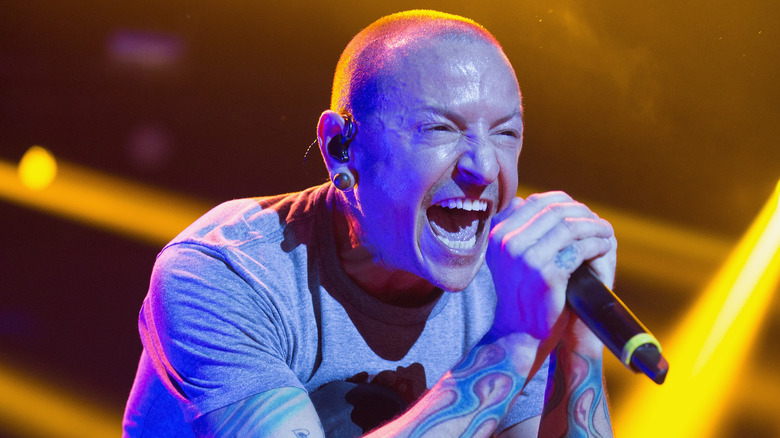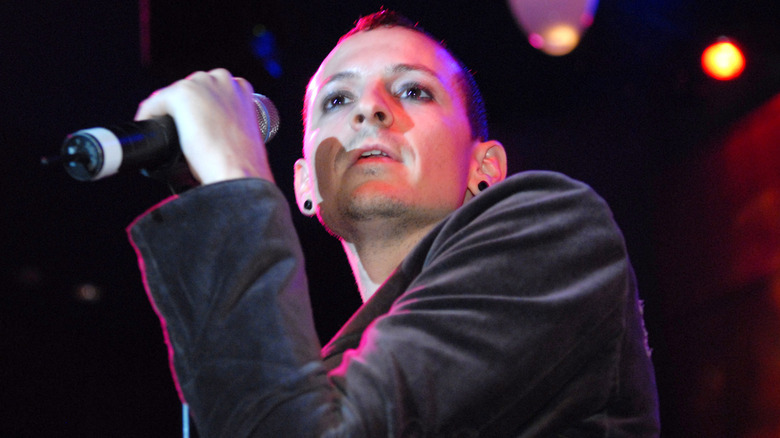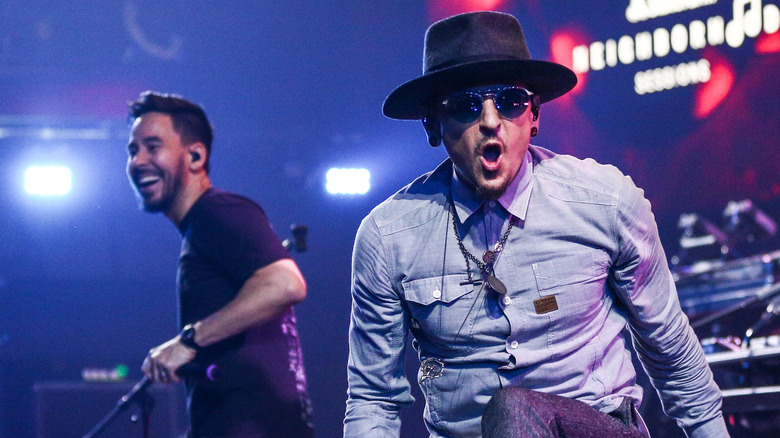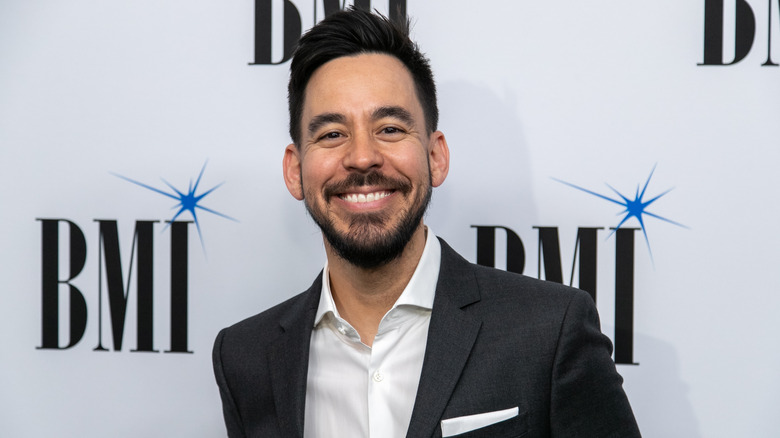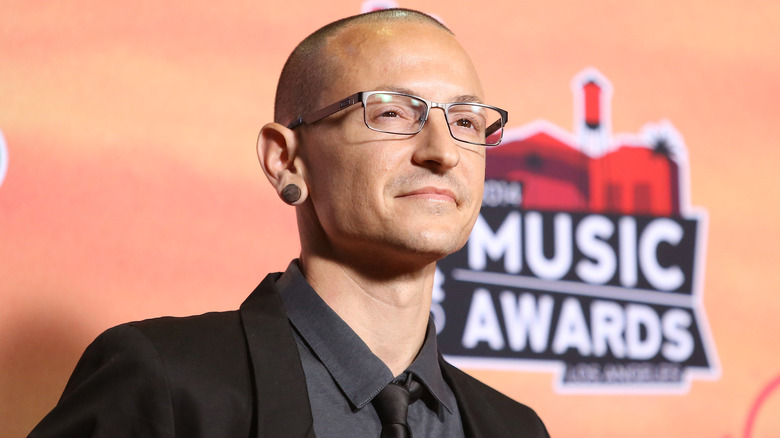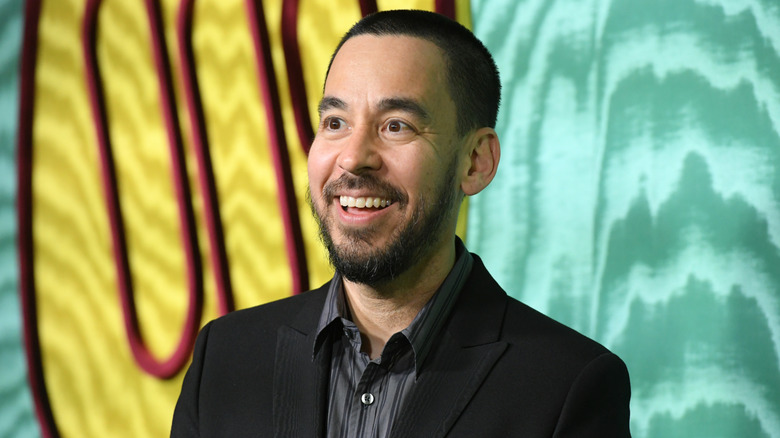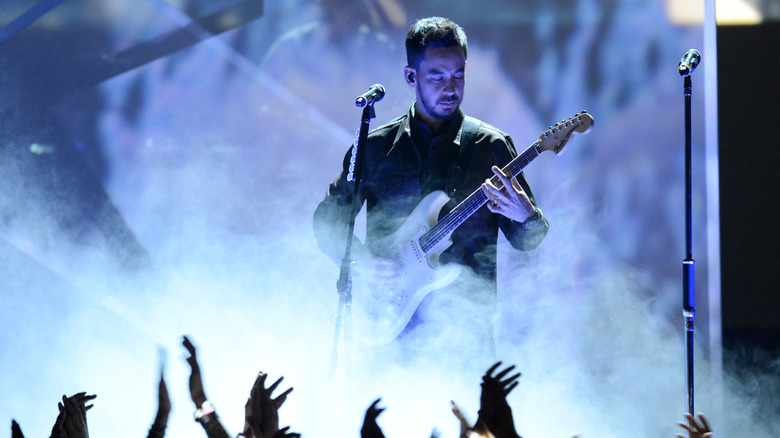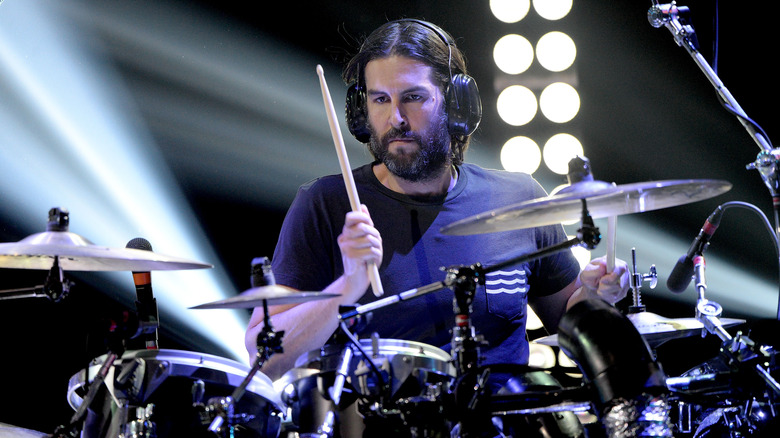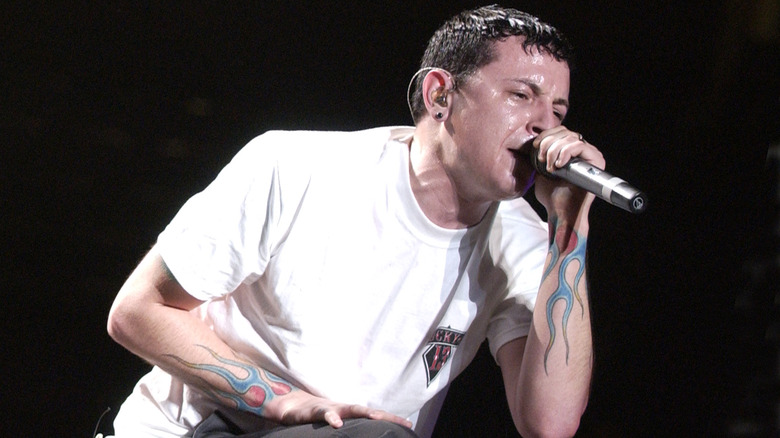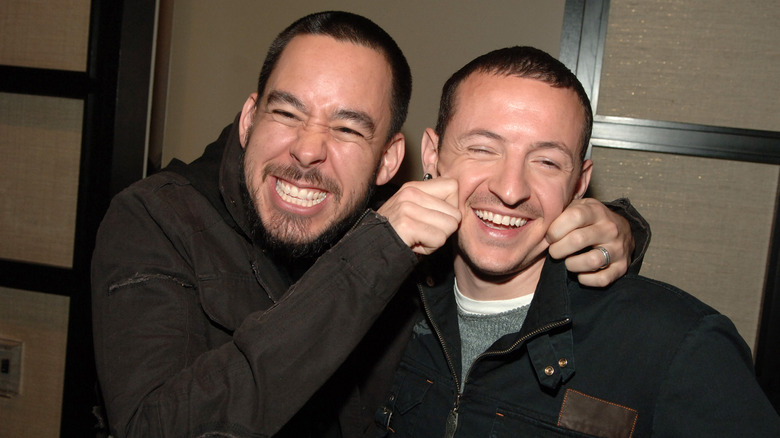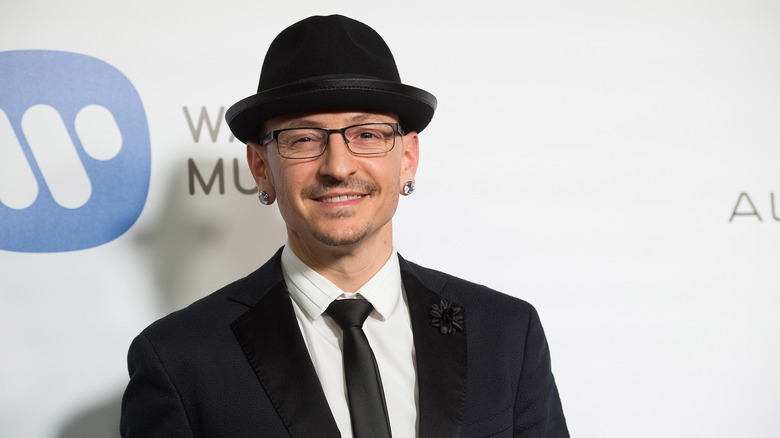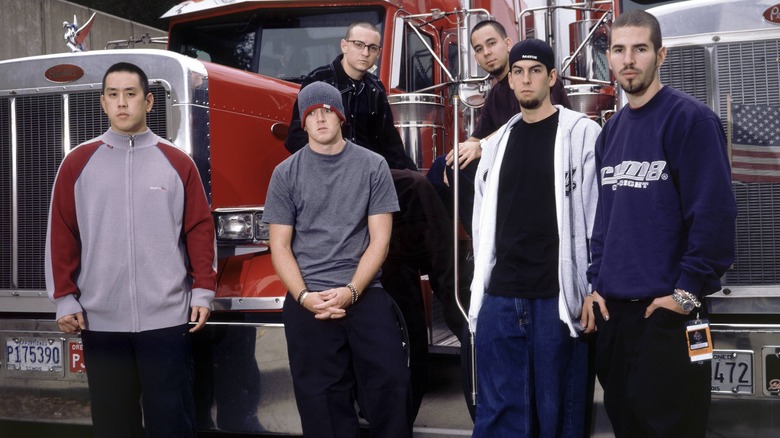The Tragedy Of Linkin Park Explained
Nothing about Linkin Park numbed fans. As one of the most important rock bands of the 2000s, they conquered the musical landscape with soul-stirring lyrics and the unmistakable oomph of nu-metal rhythm. Think of the "Transformers" films, and it's likely a Linkin Park track that comes to mind after Optimus Prime finishes one of his insightful monologues. Their meteoric rocket of success, though, came crashing back down to Earth after the tragic death of lead singer Chester Bennington in 2017. Seemingly, the light of the band faded, as it took the group many years to pick up the pieces and revisit the music once again.
Digging deep into the history of Linkin Park, fans discover both the glory and pain experienced by the different band members. From cyberstalking, racism, and lawsuits to the record label wanting to get rid of rapper and multi-instrumentalist Mike Shinoda before the group even took off, there's a lot to unpack here.
Remarkably, despite the setbacks and challenges they experienced, the story shows these individuals were destined to combine their creative powers to create the soundtrack for generations. When all is said and done, Linkin Park's name will go down in the annals of rock 'n' roll as one of the greatest of all time. To challenge one of their most renowned lyrics: In the end, it does matter.
Chester Bennington experienced abuse as a child
One of the defining qualities of Linkin Park's music centers around Chester Bennington's powerful — and sometimes heartbreaking — lyrics. As he explained to Kerrang in 2008 (via Tom-Bryant.com), he started to write lyrics in his teenage years as a way of processing complex feelings and emotions about what was taking place in his life. Bennington further revealed he experienced sexual abuse from around the age of 7 until he was 13, stating the perpetrator was a male friend who was a few years older than him. "I was getting beaten up and being forced to do things I didn't want to do," Bennington said. "It destroyed my self-confidence."
Bennington discussed how this period of his life was tumultuous and he felt scared and ashamed to open up to anyone about what was happening. His parents had split up, two of his siblings had moved away, and his father — whom he was living with then — was largely consumed by his police work. "It was an awful time," he said. "I hated everybody in my family: I felt abandoned by my mom, my dad was not very emotionally stable then, and there was no one I could turn to — at least that's how my young mind felt."
Bennington turned to music and art, as well as alcohol and drugs. Ultimately, it was a violent incident with a local gang that encouraged him to move in with his mother at the age of 17.
Chester Bennington was bullied at school
In 2004, the BBC created a campaign to raise awareness about bullying in schools and called in the assistance of a number of celebrities for this initiative. One of the people who contributed their story was Linkin Park's Chester Bennington. The singer opened up about how he used to be bullied for the way he looked in his early high school years.
"When I was younger, I was even more awkward looking than I am now," he said (via Linkin Park Association). "I'm a pretty thin, scrawny-looking kind of guy. High school was pretty rough for me. I had a lot of friends, but I also had a lot of people who really didn't like me, and I found myself defending myself a lot, and it was rough."
Bennington explained how he joined his first band when he was 13 years old; however, it wasn't with anybody from his high school. Instead, he teamed up with older teenagers who weren't from around his area to lose himself in the music. As per Kerrang, Bennington attended Greenway High School for his sophomore year, where he became more popular and accepted, especially since grunge and its aesthetic had started to become more prevalent among the youth, and Bennington was deeply entrenched in the scene. It also helped that everyone wanted to form a band, and Bennington had built up an impressive reputation for his singing and artistic abilities.
The record label wanted to fire Mike Shinoda from Linkin Park
Linkin Park's 2000 debut album, "Hybrid Theory," proved to be one of the most successful records of all time, going platinum an astonishing 12 times and delivering iconic rock hits such as "In the End," "One Step Closer," and "Crawling." However, Warner Bros. Records didn't have faith in what the group was doing at first and tried to intervene in a major way, as Mike Shinoda told Kerrang.
"We were halfway through recording when our A&R started losing faith in us," Shinoda said. "He took Chester [Bennington] aside and suggested he take the band over, or put me on keyboards, or even kick me out. He told him, 'You're the talent, you should make a rock record. You don't need the rapping, you don't need the rest of the guys...'"
According to Shinoda, Bennington showed his loyalty by telling the A&R representative to get lost. It was a risky move since Linkin Park was an unestablished, unknown quantity. Bennington could have taken the offer and cemented his own career, but he chose the band over self-preservation. Bennington himself confirmed the story to Metal Hammer, stating: "I mean the label tried to get rid of Mike, which is probably the funniest thing in the world. Looking back I was just thinking, 'Wow, this is insane, this is a wild ride.'" If it wasn't for Bennington, people might have been wondering whatever happened to Mike Shinoda from Linkin Park today.
Chester Bennington had a cyberstalker
It isn't unusual for rock stars to attract attention from fans. Sometimes, fans write them letters; other times, they wait outside of hotels to snap a pic with them. Then, there are those who take it too far and stalk their idols, such as what happened to Linkin Park's Chester Bennington and his wife, Talinda, in 2006.
As per Wired, the Benningtons started to receive strange emails and calls. The messages took a sinister tone, alluding to personal matters and reflecting too much information to be random. It wasn't long until the Benningtons experienced their accounts being hacked and being impersonated in messages to others. Concerned about what was taking place and not knowing who was doing this to them, Talinda reached out to Konstantinos "Gus" Dimitrelos, a former Secret Service agent and computer-forensics expert. Dimitrelos investigated the case, eventually tracing it back to a Linkin Park fan and computer technologist named Devon Townsend, who admitted to the cyberstalking and hacking and claimed she did it out of boredom.
Speaking about the incident, Chester said: "When you find out some total stranger has personal pictures of your kids in the bath, has phone numbers of your parents and close friends and every business associate, listens to every voicemail you've had for the last year, intercepts every email you've written or received ... it fuels my desire to make sure this kind of action is viewed as criminal." Ultimately, Townsend received a two-year prison sentence.
Mike Shinoda experienced racism in the music industry
Racism continues to be a societal pandemic, as there are still too many people who judge and mistreat others based on their ethnicity or color of their skin. In 2021, Consequence's "Heavy Sound" column featured a number of prominent Asian and Asian American and Pacific Islander (AAPI) musicians who opened up about the racism they have experienced in the music industry.
Linkin Park's Mike Shinoda contributed to this piece. He discussed how he has seen racism in every corner of the world, while stating that no social media slogans or online drives are going to halt it — instead, people need to make a conscious and dedicated effort to fight it at every turn. Shinoda also spoke about what it was like for him in the music industry.
"In general, just not having any Asian role models in music meant I didn't have anyone to look up to in that way," he said. "But more specifically, our A&R once asked us to stop using a certain logo because it 'looked like a sticker for an Asian car club.'"
A fan died outside of a Linkin Park concert in South Africa
Rock shows hold the potential to get rowdy and out of hand. That said, there's a bit of unruliness and tomfoolery, then there are concerts that devolve into absolute chaos. In the case of Linkin Park, there was no way they could have prepared for a tragedy that took place at one of their stadium shows in Cape Town, South Africa, in 2012.
As people filed into the event, a scaffolding tower containing advertisements fell over and killed attendee Florentina Heaven-Popa while also injuring 19 other people. Out of these individuals, 12 of them required treatment at a hospital for their injuries. Nearly five years after the incident, the court ruled the three companies involved in the construction and erection of the tower to have been negligent and that the tragedy could have been prevented.
After the death of Heaven-Popa and the injuries to others, Linkin Park released a statement (via News24), saying: "Though we have had no relationship with the sponsor or the entity responsible for erecting the structure, we take the safety of our fans very seriously and our thoughts are with all of those who were affected by this tragedy."
The band pushed through the pain for the music
On paper, playing and recording music professionally sounds like the ultimate dream. However, it also takes its toll on the human body — especially in the case of a band like Linkin Park, who toured vigorously and released music on a regular basis. In fact, the band members often put the music first and their bodies second for the benefit of their fans.
In 2014, Mike Shinoda told Q magazine (via Gigwise) how Linkin Park drummer Rob Bourdon pushed himself to the limit to record the album "The Hunting Party." He said: "Rob was killing himself. He played 10 hours a day for seven days straight and blew his back. He had to see a chiropractor."
In a separate interview with Kerrang, Shinoda discussed how Chester Bennington possessed the attitude that "the show must go on," describing several instances when the vocalist performed when he wasn't well, including a time in which he broke his wrist during a 2007 show. After being advised to get medical treatment and cancel the performance, Bennington turned around and said: "Are you joking? My wrist's going to be just as broken in two hours as it is now. I might as well finish the show." Famously, Bennington also broke his ankle during another tour in 2015, but he played the next show. However, the band was forced to cancel two gigs afterward.
Chester Bennington's death shocked Linkin Park and the music world
On July 20, 2017, news broke that Linkin Park's vocalist had been found dead in his Los Angeles County home. The tragic details revealed in Chester Bennington's autopsy report showed he died by suicide. The music world was rocked, as two months earlier Soundgarden vocalist and Bennington's friend Chris Cornell had died in a similar manner.
Months earlier, Bennington had discussed his mental health issues with 102.7 KIIS-FM, specifically talking about the lyrics of the Linkin Park song "Heavy" and how it related to him. "I don't know if anybody out there can relate, but I have a hard time with life sometimes," he said. "Sometimes it's great, but a lot of times for me, it's really hard."
The remaining members of Linkin Park performed a tribute concert for Bennington on October 27, 2017, where they were joined by a number of other musicians on stage. Speaking about the impact that Bennington's death had on him, Mike Shinoda told Vulture in 2018: "It goes without saying that it's hard. I used to think the stages of grief were in order, but I've realized they're obviously not, and what's so chaotic is that the sequence happens at random."
Chester Bennington would often disappear
Years after Chester Bennington's death, Mike Shinoda appeared on "The Howard Stern Show" where he discussed his former Linkin Park bandmate in more detail. Host Howard Stern mentioned the topic of depression and working with someone who experiences it. In relation to Bennington, Shinoda said, "Nobody knew the depths of it." Shinoda discussed how tumultuous Bennington's childhood had been and how he had never encountered anyone else quite like him before.
Stern asked if it had ever been difficult to work with Bennington. Shinoda said the beginning stages, around the time of "Hybrid Theory," weren't the easiest since they had the regular challenges of any upcoming band as well as the problem that Bennington would sometimes disappear. "It was hard, and so in the midst of all that, having a guy who would sneak out," Shinoda said. "He'd just go missing and come back obliterated, you couldn't even talk to him — he's just so wasted."
Shinoda added how Bennington could be "fun" when he turned up in this state, but he could be "so dark" the day afterward and not be the easiest person to deal with.
Chester Bennington's funeral was criticized by his ex-wife
Before marrying Talinda, Chester Bennington was married to a woman named Samantha for nearly 10 years, and they had a son named Draven. When Bennington died, Samantha posted a now-deleted message on her Facebook account (via Variety) where she criticized Talinda and others who organized his funeral. According to Samantha, neither she nor Draven were offered the chance to speak at the funeral service. She also lambasted how the photos only focused on Bennington's time with Talinda, while mentioning how Draven had felt excluded in the past because of Talinda's treatment of him.
In addition to this, Samantha claimed some of Bennington's relatives weren't invited, while also slamming the fact that his parents, sisters, the mothers of his other children, and the kids were excluded from the funeral program.
"I hope you like capitalizing on his death," she wrote. "Karma is real. I send you back all your energy to you a thousand time folds! Look in the mirror, I hope you like what you see. Business is business but I see zero love."
Linkin Park was embroiled in a lawsuit with a former member
In 1999, Kyle Christner became Linkin Park's bassist — then he wasn't. According to a 2023 lawsuit filed by Christner, he claimed to have received the boot before the band signed with Warner Bros. Records, even though he played on about 20 tracks that featured in the group's 2020 re-release of "Hybrid Theory." Christner alleged that a representative from the group reached out to him to offer him royalties for three demos and six tracks from the "Hybrid Theory" EP that formed part of this special edition release. When Christner questioned the royalty breakdown and stated he worked on other songs, he was informed that his work wouldn't appear on the release.
Christner filed a lawsuit, claiming that he hadn't received any money for his contributions to the band and wanted royalties. In 2024, Linkin Park reached a resolution with their former bassist. In a statement (via Rolling Stone), they said: "We are pleased to announce that we have reached an amicable resolution with bass guitarist Kyle Christner. Kyle is a very talented musician who made valuable contributions to Linkin Park at a pivotal time in 1999."
Want to find out more about the kings of nu metal? Check out the untold truth of Linkin Park.
If you or anyone you know needs help with addiction issues, may be the victim of child abuse, or is struggling or in crisis, contact the relevant resources below:
- The Substance Abuse and Mental Health Services Administration website or contact SAMHSA's National Helpline at 1-800-662-HELP (4357).
- The Childhelp National Child Abuse Hotline at 1-800-4-A-Child (1-800-422-4453) or contact their live chat services.
- Call or text 988 or chat 988lifeline.org.
